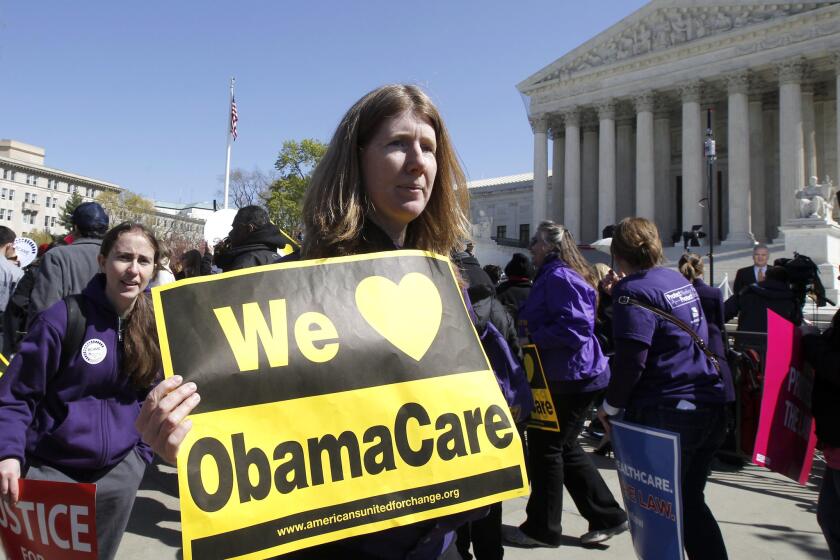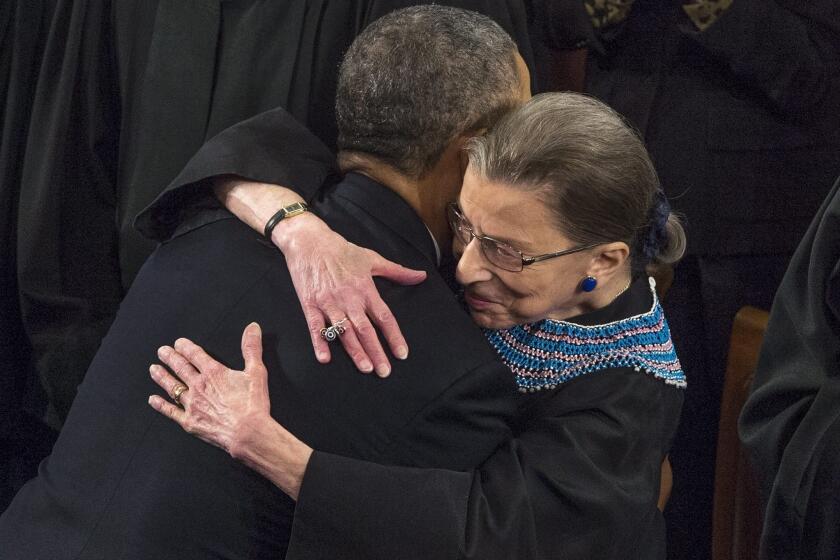Column: Biden’s Justice Department tells Supreme Court that Obamacare is constitutional

While much of the country has been riveted by the trial of ex-President Trump in the U.S. Senate, the Biden administration has continued to dismantle the Trump legacy brick by brick — most recently, by reaffirming that the Affordable Care Act is, indeed, constitutional.
In a letter sent this week to the clerk of the Supreme Court, Biden’s Justice Department informed the justices that it has reversed Trump’s position that the law should be struck down.
“Following the change in Administration, the Department of Justice has reconsidered the government’s position,” Deputy Solicitor Gen. Edwin S. Kneedler wrote.
Rather than imposing a new burden on covered individuals, the 2017 amendment ... simply eliminated any financial or negative legal consequence from choosing not to enroll in health coverage.
— Deputy Solicitor Gen. Edwin Kreedler, in letter to the clerk of the Supreme Court
As we’ve reported, the Supreme Court is pondering a lawsuit brought by Texas and several other red states asserting two points.
First, that by reducing the penalty for violating the ACA’s individual mandate to zero, the tax cut measure enacted by the Republican Congress in December 2017 rendered the individual mandate unconstitutional.
The argument is that the Supreme Court originally declared the 2010 law constitutional by interpreting the individual mandate penalty as a tax, for the enactment of which Congress has almost unlimited constitutional authority.
Cutting the penalty to zero eliminated that tax, ergo the mandate is unconstitutional, the reasoning goes. Bizarrely, the lawsuit contended that eliminating the penalty turned the law into an unconstitutional mandate to buy insurance.
Second, the plaintiffs argued that the mandate isn’t severable from the rest of the ACA, meaning that if it falls, the whole ACA falls.
The Supreme Court debated Obamacare’s technicalities, but the healthcare of all Americans hangs in the balance.
Both assertions have been widely derided by legal experts, but were accepted by a conservative federal judge in Texas in 2018. A conservative majority on a federal appeals court punted on the issues, more or less, but the judges didn’t rule them entirely out of order either.
The Trump administration threw in its lot with Texas and the other plaintiffs, declaring the law unconstitutional and refusing to defend it in court. The Supreme Court accepted the case early last year and heard oral arguments the week after the election.
Biden’s victory made it virtually certain that the federal government would move to protect the ACA. After the Senate came under Democratic control, this could be done by enacting a one-line amendment that makes clear that the mandate is severable from the law, thus rendering the lawsuit moot.
The DOJ letter is a more direct tactic, though there’s no guarantee that a majority of the court will take it on board.
California and other blue states stepped in to manage the defense. Seven friend-of-the-court briefs supporting the law were submitted to the Supreme Court, including briefs from the health insurance industry, hospital associations, the American Cancer Society and more than 16 other patient advocacy organizations and 56 legal scholars and healthcare economists.
Put together, the briefs make the points not only that the Texas argument is fatuous on its face, but also that the consequences of overturning the ACA would be dire. The law made changes to so many aspects of the American healthcare system that untangling them would be almost impossible.
Trump says he’ll protect those with preexisting conditions. Don’t believe him
Moreover, overturning the law would place health coverage of more than 133 million Americans at risk and return the country to a pre-ACA landscape in which insurance customers with preexisting conditions as serious as cancer and diabetes and as innocuous as hay fever would face rejections or heavy surcharges by insurers in the individual market.
Kneedler’s letter expressing the Biden administration’s position that nothing in the tax cut act converted the individual mandate from a tax into an unconstitutional mandate to buy insurance.
“Rather than imposing a new burden on covered individuals,” Kreedler wrote, “the 2017 amendment ... simply eliminated any financial or negative legal consequence from choosing not to enroll in health coverage.”
The Biden administration further asserts that, even if the court finds the mandate unconstitutional, it’s plainly severable from the rest of the ACA, just as Congress intended: “The 2017 Congress that reduced to zero the amount of the shared responsibility payment ... simultaneously left in place the remainder of the ACA.”
And so, the Biden administration says, should the court.









